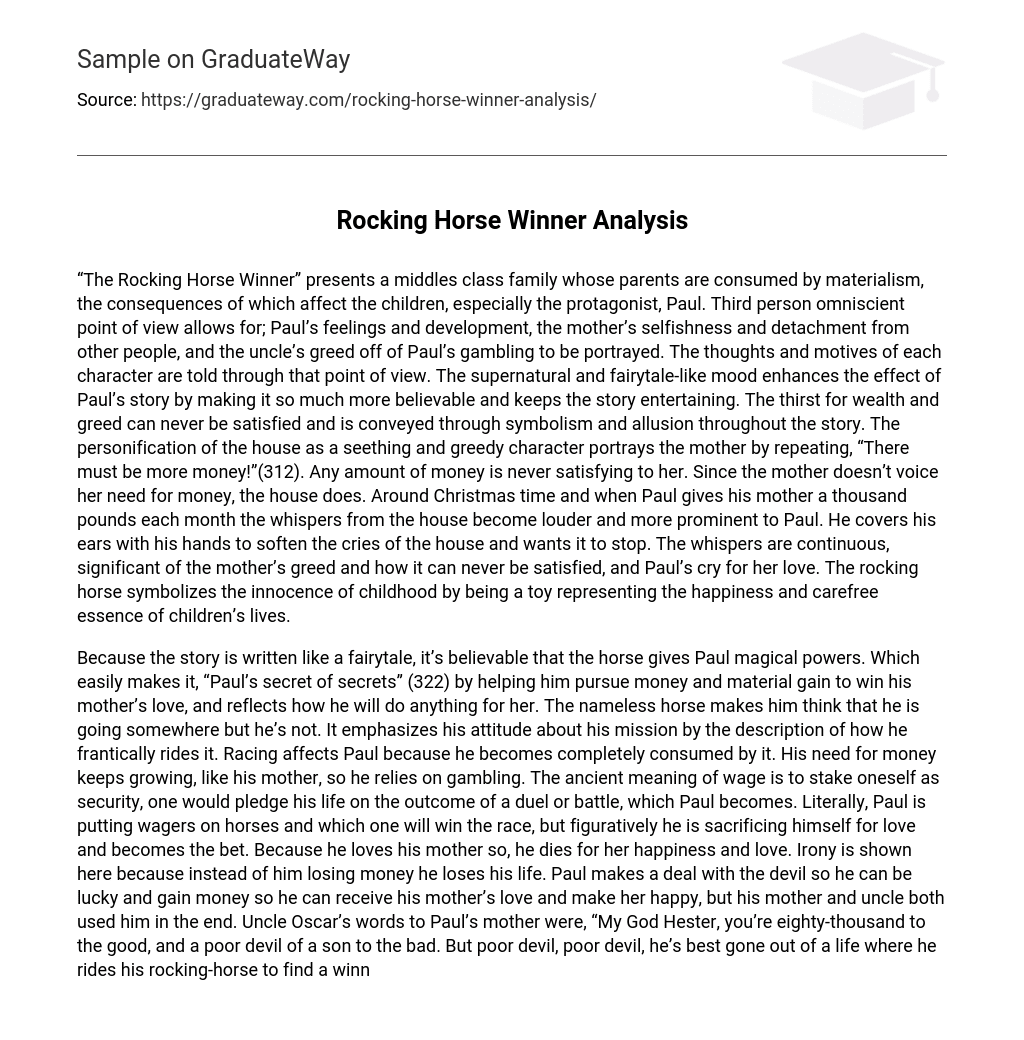“The Rocking Horse Winner” depicts a middle-class family whose parents are consumed by materialism, causing repercussions that affect the children, particularly the protagonist, Paul. The use of a third-person omniscient point of view enables the portrayal of Paul’s emotions and growth, the mother’s self-centeredness and disconnection from others, and the uncle’s exploitation of Paul’s gambling. This perspective allows insight into the thoughts and motivations of each character. The story employs a supernatural and fairytale-like atmosphere to heighten the impact of Paul’s narrative, making it more plausible and engaging. The insatiable desire for wealth and greed is consistently conveyed through symbolism and allusion throughout the story. The personification of the house as a voracious and covetous entity mirrors the mother’s constant yearning for more money. No amount of money is ever satisfying to her, as evidenced by the repeated phrase, “There must be more money!” (312). Unable to express her own lust for wealth, the house becomes her voice. The whispers emanating from the house grow louder and more prominent to Paul during Christmas time and whenever he presents his mother with a thousand pounds each month. He covers his ears in an attempt to drown out the cries of the house, desperate for them to cease. These continuous whispers serve as a poignant representation of both the mother’s insatiable greed and Paul’s desperate plea for her affection. The rocking horse serves as a symbol of childhood innocence, embodying the joy and carefree spirit associated with children’s lives.
The story presents the horse as a magical entity that grants Paul special abilities, making it his “secret of secrets” (322). This enables him to pursue wealth and material possessions in order to win his mother’s affection. The horse, though unnamed, deceives Paul into thinking that he is making progress towards his goals. His frantic riding of the horse reflects his determination to achieve his mission. Paul becomes consumed by racing, as it becomes his sole focus. His insatiable desire for money leads him to rely on gambling. The word “wage” originally meant to stake oneself as collateral, much like Paul does by sacrificing himself in pursuit of love. He places bets on horses, but symbolically, he is betting his own life. Paradoxically, he dies for the sake of his mother’s happiness and love, which is ironic considering he intended to accumulate money. Paul strikes a deal with the devil to gain luck and wealth, hoping to secure his mother’s love and happiness. However, in the end, both his mother and uncle exploit him. Uncle Oscar remarks to Paul’s mother that she has gained eighty thousand but has a “poor devil” of a son. He further states that it is better for Paul to be out of a life where he rides his rocking-horse in search of a winner (325).The text reveals the agreement Paul entered into with the devil and how his uncle exploited him for personal gain and selfish motives. In response, Paul sought to satisfy and bring happiness to his mother. The tragic outcome ensues when Paul’s mother finally develops genuine affection for him, but by then it is too late as Paul has already passed away.
It is ironic that despite spending his entire life trying to gain his mother’s love, Paul ultimately achieves his goal only as his life ends. His mother symbolizes the upper class through her possession of servants, a large house, and her ability to spend money on toys for her children during Christmas time. Despite being in debt, she prioritizes acquiring materialistic things over paying off her debt. This neglect of her children has led to their mental abuse. The mother valued appearance more than reality and deceived others into believing that she deeply loved her children, when in reality it was just an act. Moreover, she failed to instill good values in her children. The mother married for love, but it did not bring her happiness like money did. Interestingly, she sees herself as unlucky despite being beautiful, having children she wishes to please, marrying for love, and possessing artistic talents. In her mind, she considers herself the poorest and unluckiest member of her family, while in reality she is the richest and luckiest because of her family.
The theme of social criticism is conveyed through the supernatural elements in the story, such as Paul’s clairvoyance and the use of symbols and allusion. These elements highlight Paul’s determination to earn his mother’s love by giving her money, which she then uses to pursue materialistic desires in order to maintain her social status. This society prioritizes materialism over empathy and is therefore portrayed as selfish and misguided. The story highlights the significant impact that societal judgments based on financial status can have on an individual. It depicts how these judgments can consume a person and cause them to lose touch with others and reality. Ultimately, Paul’s situation is tragic because his pursuit of materialism leads him to a dead end. His mother, in losing something more valuable than material possessions – love – is left with nothing.





